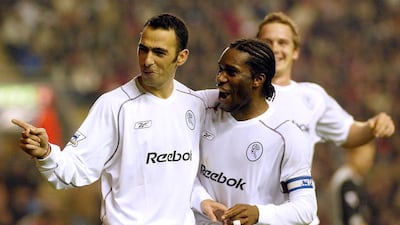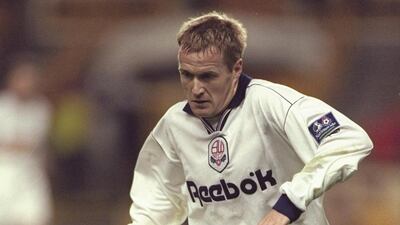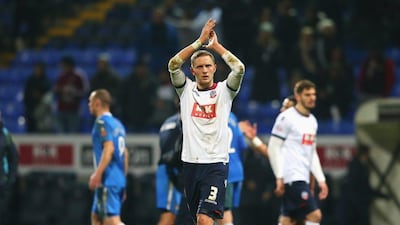BOLTON, ENGLAND // It is chillingly cold outside the Macron Stadium. One of Bolton Wanderers' modern-day FA Cup heroes stands, jacket over his arm, in the dark, reflecting on the club's 21st-century golden age. And not nostalgically, either.
A decade on, with Bolton marooned at the bottom of the Championship, English football’s second tier, it feels still more improbable that a band of Galacticos once headed for the homely club in the shadow of the Pennines.
France’s World Cup winners Youri Djorkaeff and Vincent Candela, Real Madrid’s Champions League winners Fernando Hierro, Ivan Campo and Nicolas Anelka, the Nigerian showman Jay-Jay Okocha, the double Asian Footballer of the Year Hidetoshi Nakata, Mexico’s record scorer Jared Borgetti: Bolton welcomed many a luminary and rewarded them accordingly.
Sporting Read
Find all of The National Sport’s long reads in one place
“We were paying players silly wages,” John McGinlay said bluntly. “A club of our size can’t sustain that kind of spending.” Bought from Milwall, McGinlay had altogether humbler origins than his successors. He nevertheless went on to become the 10th highest scorer in Bolton’s history, his 118 goals including the first in 1993’s shock win at Anfield that eliminated FA Cup holders Liverpool.
Now 51, the Scot is trying to make another considerable contribution to Wanderers’ cause. Bolton are £172.9 million (Dh897m) in debt, headed for the third-tier League One, up for sale and threatened with liquidation. McGinlay, once the spearhead of the side, has become a front man for the fans.
“The Supporters’ Trust is gathering momentum,” he said. “Over 4,000 fans have signed up for it and they want to make a difference. If you have ever moaned about the way your club is being run, criticised its structure or whatever else, this is your chance to have a voice.”
Wanderers strikers of different generations have united as spokesmen.
“Myself and Kevin Davies are trying to raise awareness,” McGinlay added. Davies is a rarity, a Bolton player from the days they recorded four successive top-eight finishes in the Premier League who still lives in the area.
Friday marks the 10th anniversary of a 2-0 win over Manchester City. Eleven years ago, Bolton, fresh from a 1-0 triumph over Arsenal, were in the midst of a run of seven consecutive victories. They were heady days, Bolton’s best since the 1950s.
Sam Allardyce’s side married physical power with exotic additions. The good times, McGinlay believes, were the start of the bad ones.
Because, given the almighty mess Bolton find themselves in, the question is obvious: where did it start to go wrong?
“It was probably during Sam’s reign,” McGinlay replied. “We were probably overspending then, to try and sustain and stay in the Premier League.”
It is the dark side of the Premier League dream. Some Championship clubs have overstretched themselves trying to get into the top flight.
Bolton’s problems began during their attempts to remain in it. They have multiplied since demotion in 2012. Their annual losses peaked at an eye-watering £50.7m for the 2012/13 financial year.
Much of the money they owe is soft debt to owner Eddie Davies, but the reclusive businessman has stopped funding the club. Chairman Phil Gartside, who has run it, is seriously ill. There has been a lack of transparency, about how, and why, financial problems mushroomed.
When the UK’s tax authority issued a winding-up order, over debts of £2.2m, it brought matters to a head.
“The people that have run this club have run it wrongly,” McGinlay said. “You can’t run the club with the losses we have sustained and hope to survive.” Survival, of different sorts, is a recurring theme. Seven points from safety in the Championship, they look doomed.
Also see: Greg Lea on Chelsea, the rise of Premier League parity and the demise of the English giant
The FA Cup sometimes provides troubled teams with a welcome distraction but Bolton flirted with a third-round exit to non-league Eastleigh. They reconvened for a replay on Tuesday. The British broadcasters, presuming even Bolton would not lose to a team 53 places and three divisions below them, chose not to televise the game, thus depriving each team of £120,000.
Bolton nonetheless contrived to go behind. The striker Gary Madine seemed too apologetic to celebrate their equaliser. Left-back Dean Moxey put them ahead with a stinging drive, giving Bolton the lead for the first time in 2016. It lasted for two minutes. Bolton conceded in calamitous fashion. They were booed off at half-time and booed back on by a section of the supporters 15 minutes later.
Finally captain Darren Pratley, who had scored Bolton’s late equaliser in Hampshire, staged a second rescue act with a winner. He was teed up by Shola Ameobi, whose Wanderers career is in its final throes.
Bolton simply cannot afford to renew his short-term contract. At least he has now tasted victory once in their colours. It was only Bolton’s third win in 35 games.
“A win can lift everyone,” said manager Neil Lennon. “You are hoping psychologically it will give the players a lift.” The Northern Irishman may have required one, too. He won 70 per cent of his games in charge of Celtic, but has triumphed only 24 per cent of the time with Bolton.
Autumn brought a three-month, 17-game winless run. His players were not paid in November. His private life was splashed across the front page of national newspapers, prompting Bolton to investigate allegations. This has been a crash course in crisis management.
“It is something I hope to gain a lot of experience from,” Lennon said which, one way or another, he should do. “You are doing it day by day and game by game. Every day brings some new news.”
Much of it is unwelcome, some of it essential. January could see a fire sale of players, although midfielder Mark Davies’ move to Sheffield Wednesday has broken down and flair player Zach Clough’s proposed £2m switch to Bristol City is off.
“Any money through the door is fantastic,” said Lennon. “There were player sales that were going to happen but didn’t. Between now and the end of January there will be more interest, whether bids come in or not. It makes the job very difficult but the long-term future of the club is paramount.”
He described victory as “a little bit of a financial boost as well”. Truth be told, it was not much of one. Bolton banked £67,500 in prize money but the Macron Stadium was two-thirds empty on Tuesday.
Wanderers attracted a crowd of just 8,782, despite reducing ticket prices, and will receive only 45 per cent of the proceeds, because of FA Cup rules. At least Leeds United, invariably followed by a sizeable travelling support, are their visitors in the fourth round.
The pivotal date, however, is not January 30, their next FA Cup tie, but February 22, when they return to the High Court to face the taxman. “HMRC [Revenue and Customs] takes a very strict approach towards football clubs,” said Trevor Birch, the accountant who is trying to raise funds. Going into administration would mean Bolton, who have only secured 17 points, are deducted 12.
The hope is that they have too many assets – including the stadium, a money-making hotel and two training grounds – for that to happen. Birch has agreed to sell a car park at the Macron to Peter Jones, owner of neighbouring Middlebrook Retail Park, for £3m. Offices within the stadium have also been sold.
The Euxton training ground should follow, potentially to either Preston North End or Wigan Athletic. Four consortia are trying to buy the club from Eddie Davies. One is fronted by Dean Holdsworth, their former striker, who was in the crowd as Eastleigh were eventually seen off.
Outside the ground, another old Bolton centre-forward was pondering who his preferred buyers are.
“I just want people with the club at its heart to take over and get it back to where it should be,” said McGinlay. Aided by his efforts, 4,380 fans have signed up for the Supporters’ Trust. Their hope is that Saturday’s home game against MK Dons, when season-ticket holders will be present, will help them swell their numbers to 10,000.
Adversity has galvanised many in the fanbase. Bolton have become distanced from their public as silence surrounded their footballing and financial slump. There were too few explanations. There was too little accountability.
Perhaps the sense of surprise when stellar names arrived meant questions were not asked. Now balancing the books has assumed a greater significance than importing superstars. The dream now is of a fiscally responsible club, rebuilt on sound foundations with input from the people of Bolton.
McGinlay said: “If the club is structured right and ran right, it won’t make a loss.”
Follow us on Twitter @NatSportUAE
Like us on Facebook at facebook.com/TheNationalSport




